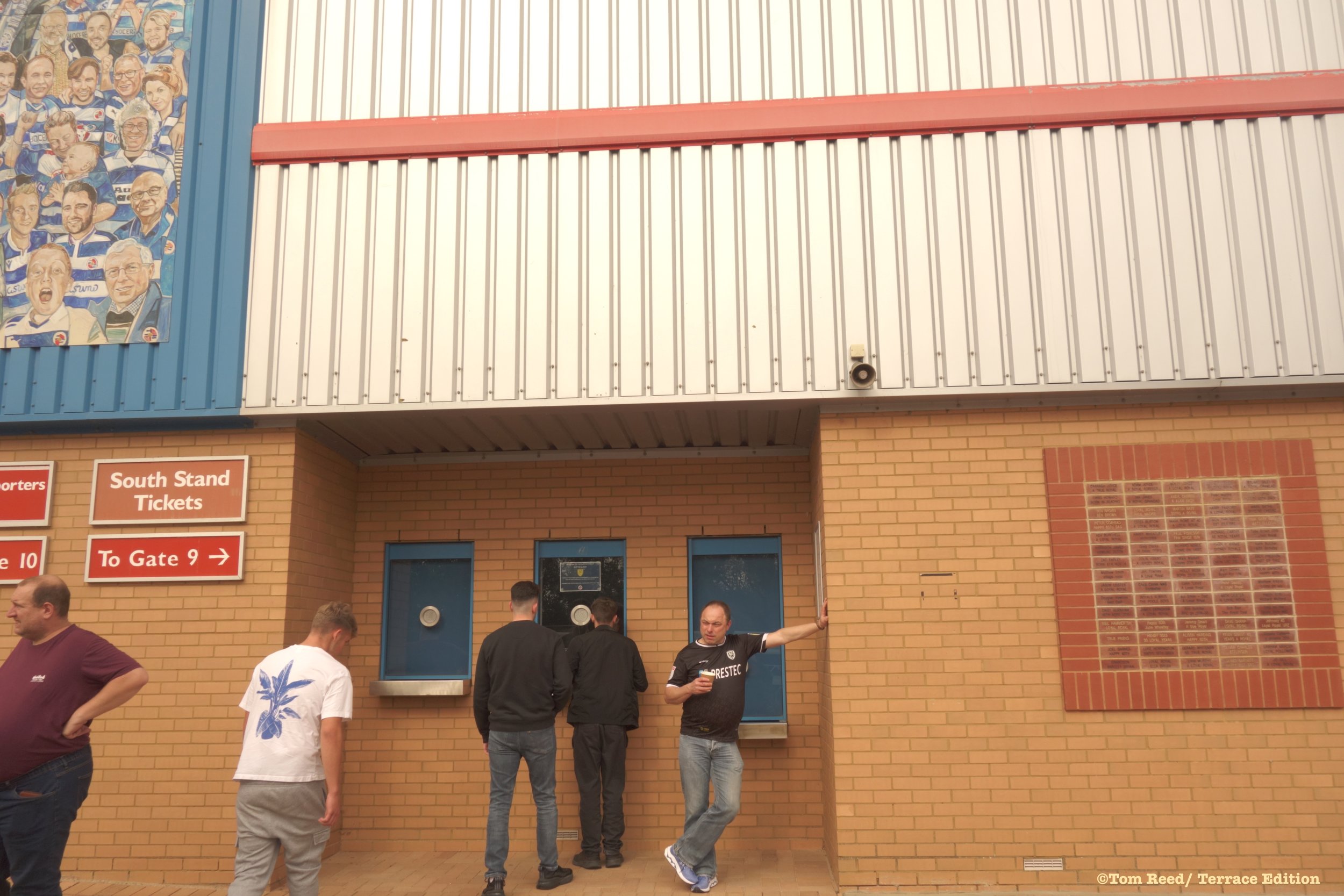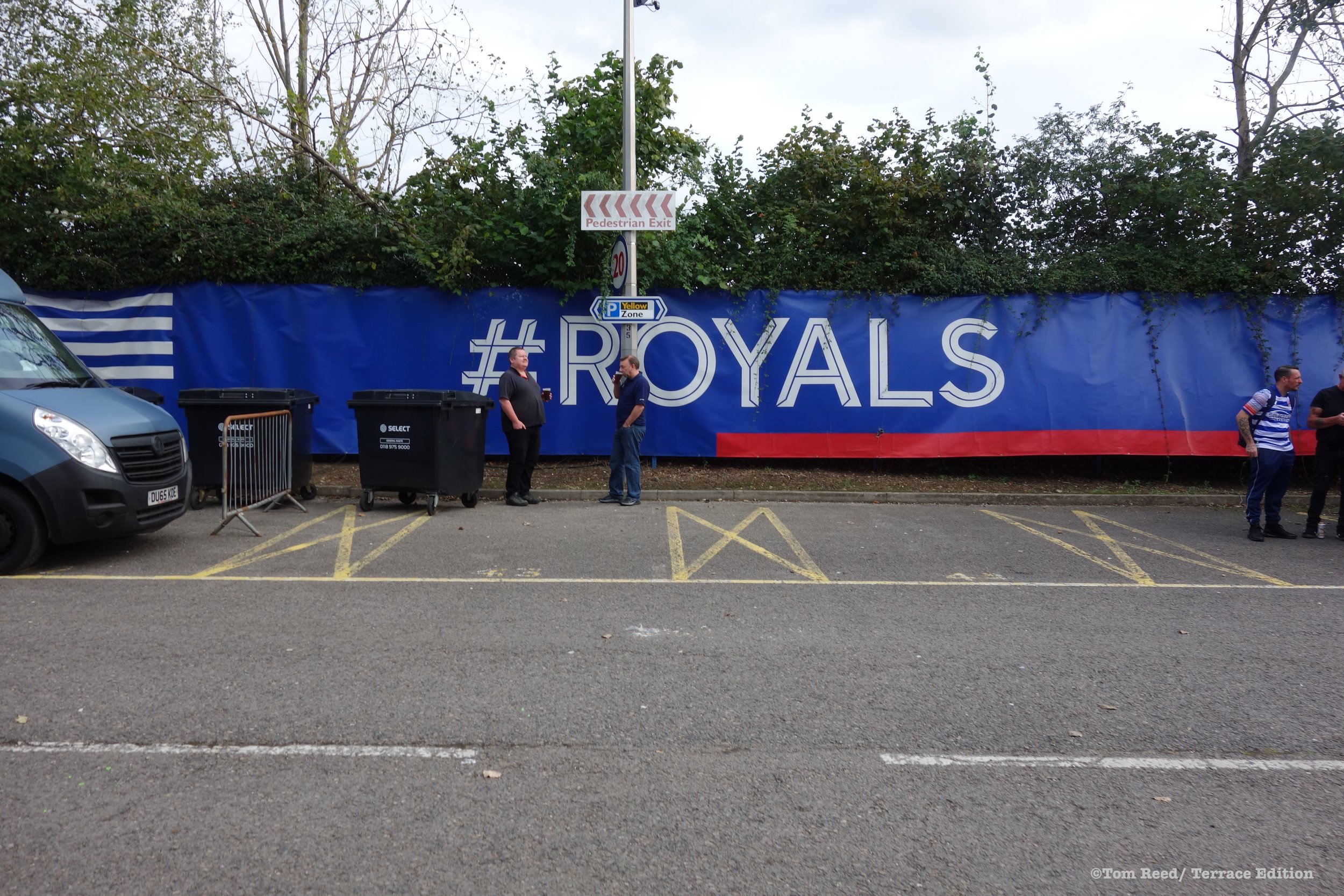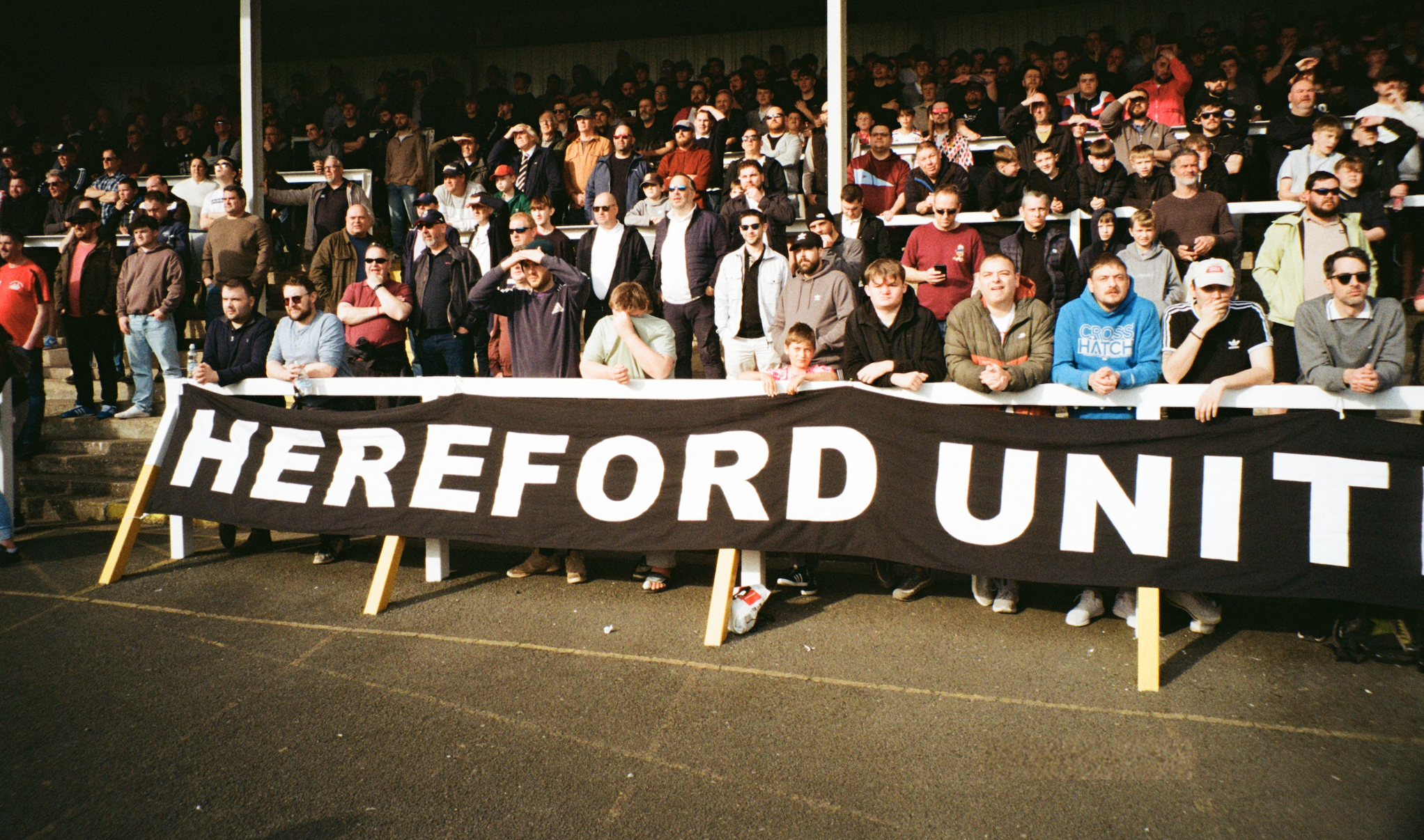Reading: Game set & match

Words: Tom Reed
Images: Tom Reed
And the sky above my head became,
Like a casque of scorching steel;
And, though I was a soul in pain,
My pain I could not feel.
The Ballad of Reading Gaol. Oscar Wilde.
Reading is known for its music festival, which over four days a year, has music drift across the pleasant Thames Valley town.
This year, the Killers headlined the Saturday but at Reading football club, it is the fear of the death of their Saturday game which has Royals fans dull-eyed at the reign of Chinese owner Dai Yongge.
Reading fans have stood up to be counted before, notably against the proposed 1983 merger with Oxford United to create the “Thames Valley Royals”.
Yet their 1999 “Pants Day” protest showed a generally relaxed fanbase who’d prefer to use humour as a weapon, rather than the kind of disruptive direct action that went down on Saturday at the Select Car Leasing stadium.
“We advocate the WAVING of PANTS as an expression of good-natured criticism for the lack of effort, passion and style shown by our team” read the 1999 manifesto.
The fact that the Reading vs Burton Albion match was stopped by a hail of tennis balls shows just how far these perfectly reasonable fans have been pushed, in a move which might represent the bitter end for problem owners in the English game.
©Tom Reed/ Terrace Edition. Reading FC.
“Reading’s ‘desperate’ plight: £191m losses, 16 points docked and a silent owner” read an Athletic headline for a story released the day before the Burton match. Philip Buckingham’s forensic article drew attention to the club’s ongoing transfer embargo but also an overdue tax bill, an alleged short-term loan from a sponsors to pay the wage bill and the ill-fate of two other clubs owned by Mr Yongge.
While the Athletic piece threw light on the seemingly precarious nature of Reading’s running, Royals fans were warming up their pitching arms for the latest set of what is known in German as “Tennisballaktion” a form of protest where football matches are halted by a volley of tennis balls.
In August, fans of fellow beleaguered club Southend United temporarily stopped their match vs Eastleigh using the tennis ball method, which has a similar under-foot effect to football matches as baubles did to the burglers in Home Alone.
Southend fans added squeaky rodent toys in homage to their hated owner, who has been labelled Ron “The Rat” Martin and it seems large pet stores are in for a windfall, with fans buying reasonably priced projectiles to pelt the playing surface.
Indeed, it wasn’t Slazenger balls but Pets At Home specials that were being passed around before kick-off on Saturday as stewards gave every entrant a thorough but ineffectual patting down.
©Tom Reed/ Terrace Edition. Reading FC.
The match had been designated “Black Saturday” by the Sell Before We Dai” coalition, which is campaigning for a new dawn at Reading and the Club 1871 section, who create the noise behind the goal, dressed in black fatigues, was an ominous sign for the current administration at the club.
The match being played amongst black balloons floating onto the pitch was symbolic of a supposedly big money game existing with pockets of real dysfunction and a banner which read “Football has an ownership problem” spoke for itself.
Advocates of the 50+1 model in Germany, who are against private “investor” system in England must be feeling very smug indeed with the raft of supporter protests and crisis clubs on these shores.
In many ways, the barrage of tennis balls that carpeted the pitch at Reading and stopped play for a good ten minutes weren’t just for the Royals, they were for Southend, West Bromwich Albion, Scunthorpe United et al and supporters looking for a more progressive and community-centred approach to how their clubs operate.
Post-match, the Sell Before We Dai group were thinking of the bigger picture when digesting the action on a day where a young Reading side were held to a goalless draw by Burton, quite the fall from grace since the Premier League years of the early 2010’s.
“It was a powerful moment seeing so many Reading fans uniting with one shared purpose. Reading are just one of a number of clubs up and down the country facing an existential crisis, many have gone before and if things don't change, that list will keep growing.”
“That's why the 'Football has an ownership problem' banner is front and centre - the tagline hits hard with too many fans across the football pyramid - it includes Reading but is bigger than Reading.”
“We hope the attention from this campaign can be a driving force for real change, including determining whether the Independent Football Regulator will be fit for purpose by using Reading as a test case.”
Like a lob on the tennis court, there is talk of Reading fans joining with Southend and West Brom supporters to put their opponents on the back foot and draw collective attention to the way football clubs are run in England.
With an incoming Independent Regulator and supporters equally prepared to investigate poor ownership and prevent matches being played if needs be, time is running out for club owners who simply do not run clubs in a modern, sustainable way that lives up to the community remit of their positions.
©Tom Reed/ Terrace Edition. Reading FC.
Reading is a well placed town, at most a hour and half to central London, Bristol, Oxford and the South coast but the die-hard Royals wouldn’t dream of going anywhere else.
Their old rivals Aldershot, went to the wall in 1992, and have never really recovered, plying their trade now in non-League.
1992 was the year when Brian Lomax and co set up the first supporters’ trust at Northampton Town, funnily enough the same year the Premier League burst into life, drowning the message that fans should be on club boards and that community ownership of teams was a sensible counterweight to the free-market game.
Fan-ownership looks a big push at Reading, with the sums involved and a potentially problematic sale of the stadium to a company associated with Mr Yongge in 2019, on valuable land in the commuter town.
But that is the difficult place English football finds itself, in thrall to the next oligarch, sportswasher or “businessman” from an exotic location but operating in a global financial contraction and often ill-equipped to service the basic needs of clued up supporters.
Reading fans won’t take a step back now though, for they are at the advertising hoardings, with much within range.
©Tom Reed/ Terrace Edition. Reading FC.
©Tom Reed/ Terrace Edition. Reading FC.
©Tom Reed/ Terrace Edition. Reading FC.
©Tom Reed/ Terrace Edition. Reading FC.
©Tom Reed/ Terrace Edition. Reading FC.
©Tom Reed/ Terrace Edition. Reading FC.
©Tom Reed/ Terrace Edition. Reading FC.
Tom Reed is Terrace Edition Editor and can be found on Twitter: @tomreedwriting
Sell Before We Dai are on Twitter: @SellBeforeWeDai















